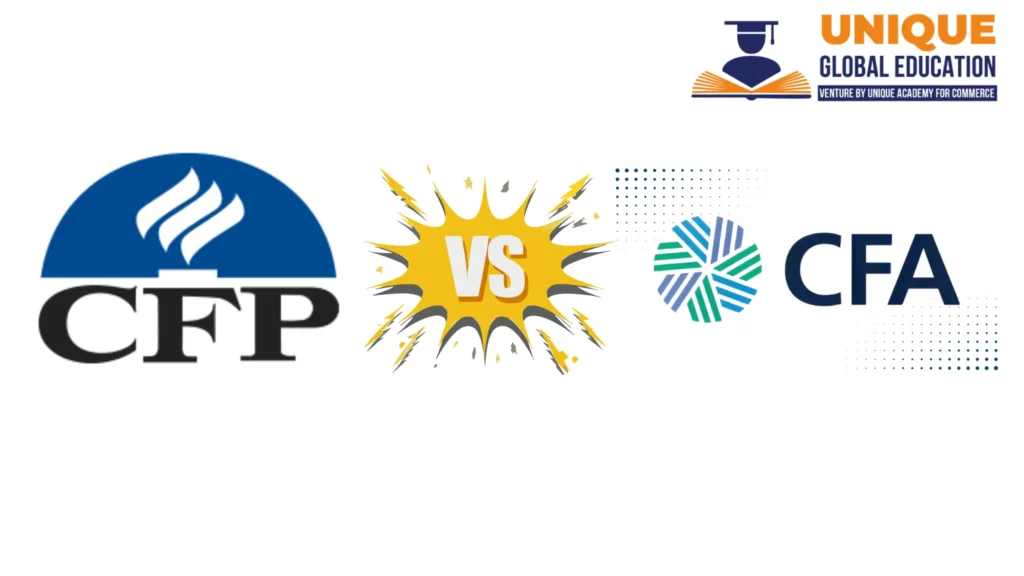Career paths within the financial services sector are numerous, and for those looking to establish themselves as successful wealth managers or private bankers there are arguably no two more prestigious designations than Certified Financial Planner (CFP) and Chartered Financial Analyst (CFA).
They both are respected certifications, but they’re for different purposes and goals. According to the year 2025, when individualized financial planning and technology-enabled investment management are more in demand than ever, it may seem like the discussion of CFP vs CFA has more relevance to today’s aspirants.
In this blog, we compare the differences CFA or CFP, depth and career prospects of these two certifications to help you determine if one is more fitting for your wealth management and private banking profession.
Table of Contents
1. Understanding the Certifications
What is CFP?
The Certified Financial Planner (CFP) is an international designation concentrating personal finance and wealth management, as well as retirement planning, estate planning, and tax. It is a client-centered, product-free program built to help professionals like you create a low-cost solution for individuals and families’ financial health.

What is CFA?
Chartered Financial Analyst (CFA) is an internationally recognized designation granted by the CFA Institute based in the USA that concentrates on investment management, portfolio management analysis and research analysis as well as financial markets. It is more investment- and institution-driven than client-centric.
2. Focus Areas: CFP vs CFA
- CFP focuses on planning for individuals and families. Subjects include but are not limited to the following: Budgeting, insurance, retirement/estate planning and taxation, client relationships.
- CFA emphasizes deep investment expertise. It touches on ethics, financial statement analysis, corporate finance, derivatives, fixed income analysis equity valuation, alternative investment and portfolio management.
For wealth management and private banking, both are good but the role you target determines which is better for you:
- If you want to be a holistic financial planner for people, CFP makes sense.
- Again, if you intend to manage investments, portfolios or institutional wealth, CFA gets a broader smile from others.
3. Duration and Difficulty
- CFP is usually achievable in 1–2 years (country and prior degree dependent).
- CFA takes significantly longer since you have to pass 3 levels – period of time it will take is 3 ‐5 years on average.
It is believed that the CFA is more difficult on average. Pass rates for each level tend to fall in the 35–45% range, though marginally higher for CFP certification.
4. Costs Involved
- Cost of CFP Certification: It varies according to the region but it’s in approximate range of Rs 2–3 Lakhs in India and $2,000–$5,000 internationally.
- CFA Program: Cost is on the higher side, ranging between ₹3–5 lakhs (India) or $3,500–$7,000 including exam fees and study materials.
5. Global Recognition
- CFA has no peer in its world-wide prestige, especially investment banking, portfolio management, hedge funds, and private equity.
- CFP is well regarded in wealth management and private banking, that is booming private financial planning industries growing up like mushrooms in north America, Canada, Australia as well as India.
Get More Details CFA Classes Pune and Face To Face Batches
6. Career Paths
With CFP:
CFP holders also typically work with individuals and high-net-worth individuals. Popular roles include:
- Financial Planner
- Wealth Manager
- Private Banker (relationship based)
- Estate Planning Advisor
- Retirement Planner
With CFA:
Here institutions are going to look for CFA-qualified people. Popular roles include:
- Portfolio Manager
- Investment Banker
- Analyst – Equity or Credit
- Private Equity or Hedge Fund Analyst
- Institutional Wealth Manager

7. Relevance in Wealth Management & Private Banking
Wealth management and private banking involve people skills AND investment skills. Here’s how each designation contributes:
CFP in Wealth Management
- Good on counselling for the individual and family.
- Helps to establish a personalized plan for savings, retiring, estate and taxes.
- Great for building up your client relationships.
CFA in Private Banking
- Great for building a portfolio, asset allocation and portfolio strategy.
- Enhances credibility when working with high-net-worth clients and institutional accounts.
- Developer Analyst You are trained to get into roles, which are mostly analytic or Research oriented.
Bottom Line: If you’re on the relationship side of private banking (managing someone’s entire wealth) then maybe CFP is ideal. If it is more investment focused – CFA is super (PM and MM for HNI’s)
8. Salary Comparison
Below is a rough comparison and some of the opportunities available (hope on average in 2025): Note: Salaries will vary by location, experience, role.
| Role | Average Salary (India) | Average Salary (Global) |
| CFP (Wealth Manager/Private Banker) | ₹8–15 LPA | $70,000–100,000 |
| CFA (Portfolio/Investment Manager) | ₹12–20 LPA | $90,000–150,000 |
CFA usually pays better, but CFPs make big salaries too, especially if they’re working private banking jobs where client trust and advisory skills are prized.
9. Which One Should You Choose in 2025?
Ask yourself:
- Do you prefer to concentrate on people’s money, personal finance and relationship dynamics? Choose CFP.
- Do you desire to concentrate in Portfolio Management, Equity Research and Institutional Investing? Choose CFA.
When it comes to private banking jobs, a hybrid of the two is even stronger. Many pundits do the CFA for technical expertise and CFP for comprehensive client planning and bring to the table a well-defined career profile.
FAQs on CFP vs CFA for Wealth Management and Private Banking
CFA is harder with 3 levels and lower pass rates. CFP is easier and briefer to complete.
Both are useful. And let’s not forget about the CFP versus a CFA – while both are great, they each cover different strengths: A CFP is more concentrated on client relationship management and holistic financial planning, whereas CFA has its strength in investment strategy and portfolio management.
Yes. Many professionals obtain both as the CF involves a wide range of wealth mngt (CFP) and stellar investment analysis (CFA). This combination is of high interest for a house bank.
CFA salaries are generally higher with a particular emphasis on institutional jobs. But CFPs in private banking can also be paid well due to client confidence and incentives.
The CFP is known internationally but more popular in some countries than others, such as US, Canada, Australia and India. CFA has craze across countries and there are various industries recognizing it.
Final Thoughts
Wealth management / private banking In 2025, jobs in wealth management and private banking will require a blend of technical capability around investments, combined with sophisticated client advisory skills.
- If you are interested in specializing both in the art of financial planning and relationship building, CFP is an appropriate selection.
- If you are interested in investment analysis and portfolio management, then go for CFA.
- For the next generation of private bankers, a partnership between CFP and CFA talent is an ideal combination that synergizes client relationships with investment insight.
Ultimately, it depends more on your career goals as to which is “better,” but both designations provide you with an excellent foundation for success in the wealth management world and also in private banking.
Get More Details CFA Classes Pune and Face To Face Batches





